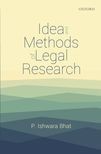 Idea and Methods of Legal Research
Idea and Methods of Legal Research
Contents
-
-
-
-
-
-
-
-
-
-
-
15 Canons, Contours, and Contributions of Policy Research in Law: A Note on Methodological Discourse
-
-
-
-
-
-
Importance Importance
-
Forms and Distinctions Forms and Distinctions
-
Ideals to Be Aimed at and to Be Attained Ideals to Be Aimed at and to Be Attained
-
Pre-draft Preparation—Phase I: Formulation of Ideas Pre-draft Preparation—Phase I: Formulation of Ideas
-
Pre-draft Preparation—Phase II: Sketching the Outline or Synopsis Pre-draft Preparation—Phase II: Sketching the Outline or Synopsis
-
Writing the Research Report or Thesis Writing the Research Report or Thesis
-
Post-Draft Refinement Post-Draft Refinement
-
Other Forms of Research-Based Critical Legal Writing—Methodology of Drafting Other Forms of Research-Based Critical Legal Writing—Methodology of Drafting
-
Research Paper Research Paper
-
Notes and Comments Notes and Comments
-
Book Review Book Review
-
-
-
-
-
18 Legal Writing Based on Research
Get access-
Published:January 2020
Cite
Abstract
Like other forms of legal writing, such as client-related writing for litigation and transaction purposes and norm-creating legal writing in the form of legislation and judgments, academic legal writing based on research has great importance for legal development. Its forms include research report, article, notes/comments, and book review. Clarity of expression, continuity of thought, coherent presentation, and readability are the ideals to be attained. Formulation of ideas by responding to data and perspectives of legal ideals is a good starting point for preparation of a draft. Sketching the outline or synopsis or writing an abstract provides some shape to the draft thesis. Writing with originality and by due acknowledgement of sources; maintaining fairly high level of discussion; and writing without bias, deviations and repetition contribute to quality writing. Finally, post-draft refinement should address the issues of avoiding errors of language, subject, and technicality of references.
Sign in
Personal account
- Sign in with email/username & password
- Get email alerts
- Save searches
- Purchase content
- Activate your purchase/trial code
- Add your ORCID iD
Purchase
Our books are available by subscription or purchase to libraries and institutions.
Purchasing information| Month: | Total Views: |
|---|---|
| October 2022 | 36 |
| November 2022 | 27 |
| December 2022 | 15 |
| January 2023 | 38 |
| February 2023 | 10 |
| March 2023 | 15 |
| April 2023 | 27 |
| May 2023 | 18 |
| June 2023 | 12 |
| July 2023 | 35 |
| August 2023 | 13 |
| September 2023 | 20 |
| October 2023 | 20 |
| November 2023 | 45 |
| December 2023 | 37 |
| January 2024 | 21 |
| February 2024 | 29 |
| March 2024 | 23 |
| April 2024 | 26 |
| May 2024 | 9 |
| June 2024 | 18 |
| July 2024 | 13 |
| August 2024 | 3 |
| September 2024 | 23 |
| October 2024 | 26 |
| November 2024 | 38 |
| December 2024 | 24 |
| January 2025 | 17 |
| February 2025 | 10 |
| March 2025 | 21 |
| April 2025 | 21 |
| May 2025 | 6 |
Get help with access
Institutional access
Access to content on Oxford Academic is often provided through institutional subscriptions and purchases. If you are a member of an institution with an active account, you may be able to access content in one of the following ways:
IP based access
Typically, access is provided across an institutional network to a range of IP addresses. This authentication occurs automatically, and it is not possible to sign out of an IP authenticated account.
Sign in through your institution
Choose this option to get remote access when outside your institution. Shibboleth/Open Athens technology is used to provide single sign-on between your institution’s website and Oxford Academic.
If your institution is not listed or you cannot sign in to your institution’s website, please contact your librarian or administrator.
Sign in with a library card
Enter your library card number to sign in. If you cannot sign in, please contact your librarian.
Society Members
Society member access to a journal is achieved in one of the following ways:
Sign in through society site
Many societies offer single sign-on between the society website and Oxford Academic. If you see ‘Sign in through society site’ in the sign in pane within a journal:
If you do not have a society account or have forgotten your username or password, please contact your society.
Sign in using a personal account
Some societies use Oxford Academic personal accounts to provide access to their members. See below.
Personal account
A personal account can be used to get email alerts, save searches, purchase content, and activate subscriptions.
Some societies use Oxford Academic personal accounts to provide access to their members.
Viewing your signed in accounts
Click the account icon in the top right to:
Signed in but can't access content
Oxford Academic is home to a wide variety of products. The institutional subscription may not cover the content that you are trying to access. If you believe you should have access to that content, please contact your librarian.
Institutional account management
For librarians and administrators, your personal account also provides access to institutional account management. Here you will find options to view and activate subscriptions, manage institutional settings and access options, access usage statistics, and more.